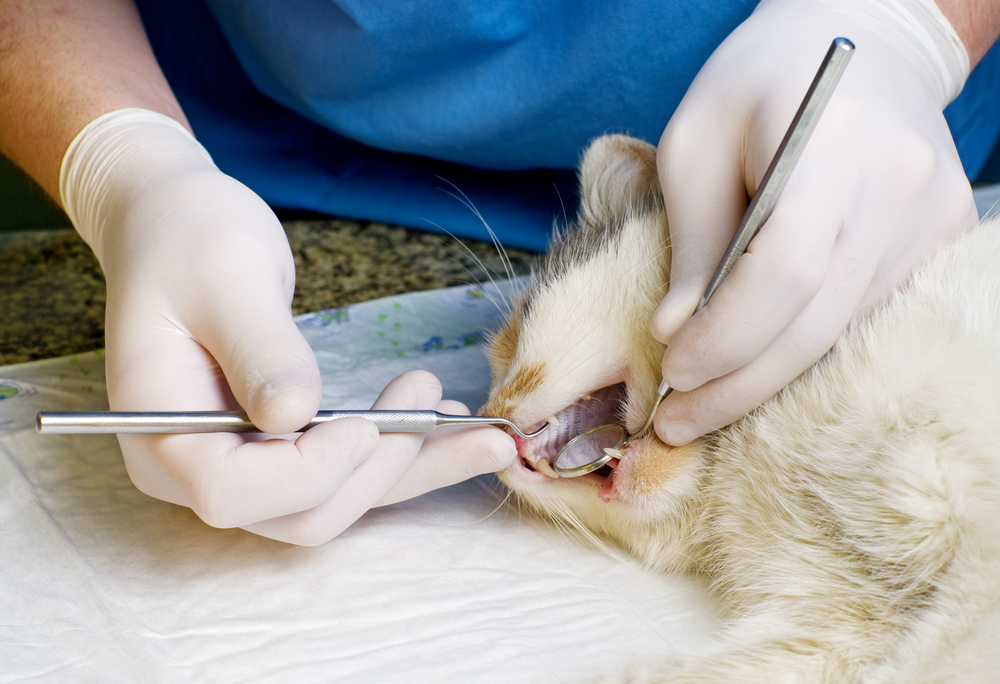Your cat’s overall health is important, of course. Cat dental care is an important aspect of your kitty’s health too. Cat Clinic of Johnson County offers cat dental care that you can depend on for the health and well-being of your favorite felines.
Common cat dental care issues
Cats have many of the same dental problems that people do. The primary problem is that your cat cannot tell you when it is having a dental issue. Treatment is largely the same too, except that your cat may need special care when undergoing dental treatments.
- Periodontal disease: Gum disease is the most common type of dental problem in cats; by the time your cat is 3 years old, it will likely show some signs of periodontal disease, which gets worse with age when left untreated.
- Cavities: Cats have fewer cavities than do people, but they still get them.
- Cracked or broken teeth and teeth roots.
- Abscesses or infected teeth.
- Cysts or tumors in the mouth.
- Malocclusion: Misalignment of a cat’s teeth and bite.
- Broken jaw: Fractured jaws are not uncommon in cats and may occur from falling from a great height, being hit by a car, or other traumatic accident; the lower jaw usually breaks in the middle of the chin, making it hard for the cat to eat.
- Palate defects: These affect the roof of a cat’s mouth; a cleft palate is an abnormal opening in the roof of a cat’s mouth.
Some dental problems can cause health issues in other areas of your cat’s body. Gum disease can affect your cat’s heart muscles, kidneys and liver, for example.
Does my cat have dental problems?
To keep your cat’s teeth and mouth healthy, the veterinarians at Cat Clinic of Johnson County should check your cat’s teeth at least once a year. During these annual visits, our veterinarians will look for early signs of dental problems.
Your cat may develop dental problems in between visits. Have your cat’s teeth checked soon if your cat has any of the following problems:
- Bad breath.
- Loose or broken teeth.
- Teeth that are discolored or covered in tartar.
- Extra teeth or baby teeth that stayed too long.
- Abnormal drooling.
- Abnormal chewing or dropping food from the mouth.
- Reduced appetite or refusing to eat.
- Signs or discomfort or pain in or near the mouth.
- Swelling anywhere in or near the mouth.
- Bleeding from the mouth.

Some cats with dental problems become irritable. Others become quiet and hide. Always be careful when examining your cat’s mouth, as a cat in pain may bite. Make an appointment with our veterinarian if you notice any changes in your cat’s behavior.
What you can expect from a cat dental exam
Our veterinarian in Lenexa will start by examining your cat’s mouth and determining if your cat needs a dental cleaning or other treatment. We will review with you any procedures we feel are necessary before we start any treatment. Since it is hard to predict the extent of dental disease before we start treatment, we request that you leave a phone number so that we can reach you during the procedure. We may perform blood tests before the procedure to ensure that your cat’s kidneys and liver are functioning well enough for your cat to undergo anesthesia. We may also evaluate the health of your cat’s heart and abdomen.
At the Cat Clinic of Johnson County, our veterinarians offer teeth cleaning to help your cat’s teeth and gums stay healthy. We offer other dental services too, such as filing teeth, making adjustments to teeth that affect the way your cat bites food, and extracting teeth that are too decayed to be treated.
Only veterinarians should perform these procedures on cats. Regulations put into place by states and provinces lay out the details of the dental procedures veterinarians and veterinary technicians can perform.
Our dentist may perform X-rays to evaluate the health of your cat’s jaw. Most dental diseases occur below the gum line, and X-rays also create images of the tooth roots and other structures that are not visible. These images help our veterinarians see dental diseases before they cause a problem for your cat. We may recommend scaling to remove the dental plaque and tartar that can lead to tooth decay.
Dental care for your cat may require anesthesia
When you visit your dentist, you understand that dental care will help keep your mouth healthy and pain-free. You can also tell your dentist about your symptoms and indicate whether a procedure is causing pain. Your cat is unable to understand the benefits of dental care, though, and your cat cannot describe symptoms or pain. Your cat may react to dental care by moving, trying to escape, or biting.
Anesthesia helps your cat stay still, calm and pain-free during dental care. It also helps our veterinarians perform dental procedures without the risk of being bitten. Anesthesia can even improve the quality of care your cat receives, as it is easier to get clear images on an X-ray and better results from dental cleanings when your cat is very still. While anesthesia will always present risks, it is now safer than ever before, and the benefits greatly outweigh the risks.

Our veterinarians can recommend ways you can keep your cat’s teeth healthy at home
Prevention is the key to keeping your cat’s teeth and gums healthy. Our veterinary team can show you how to brush your cat’s teeth to remove the plaque that can lead to tooth decay. We can also recommend food and other products to optimize your cat’s oral health.
For more information about cat dental care in Lenexa, Kansas, contact the Cat Clinic of Johnson County.

